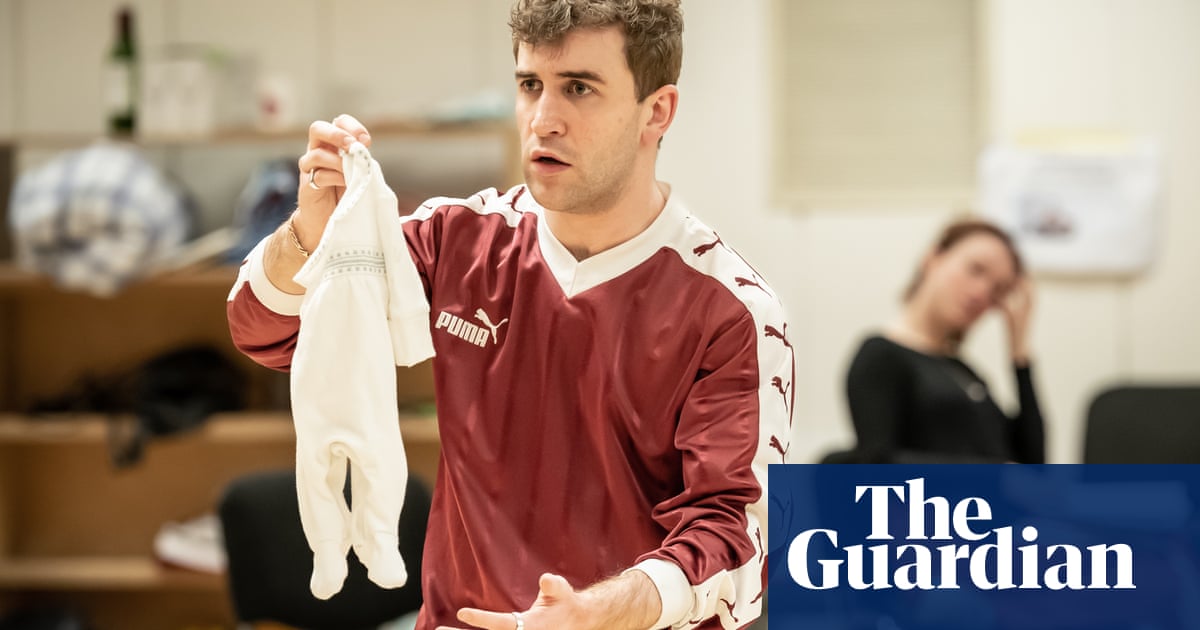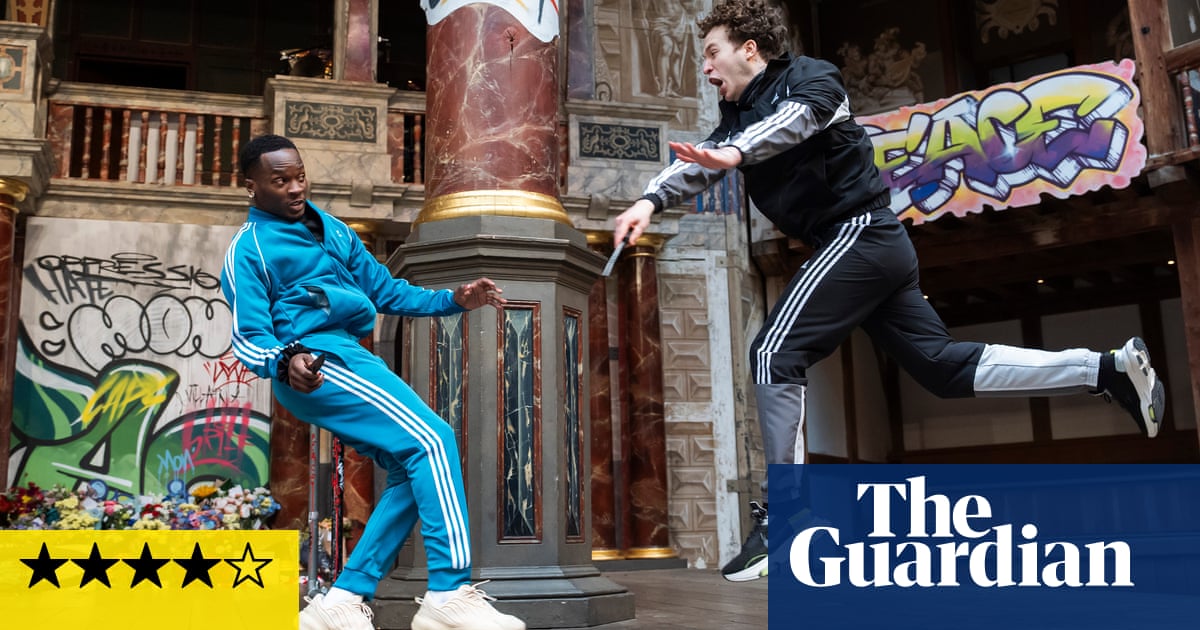
Gary Owen has always loved romcoms. When Harry Met Sally? “It’s the best.” The Worst Person in the World? “Incredible!” This might surprise anyone who has seen Owen’s political plays and been hit by their searing interrogations of social injustice, demotic poetry and unsentimental power.
But the Welsh playwright has been trying to write a romcom for years, he explains, over lunch at the National Theatre with Irish director Rachel O’Riordan. The two are longtime collaborators: last year, O’Riordan revived her production of his 2015 play Iphigenia in Splott, an incendiary take on ancient Greek tragedy that was an indictment of modern-day Britain. Now, they are teaming up for Romeo and Julie, which puts a romcom-ish spin on Romeo and Juliet. The “ish” is key: Shakespeare’s tragedy would need quite a spin considering its double-suicide ending.
“We say it is inspired by Romeo and Juliet,” says O’Riordan. “There’s a spirit of the play in there.” Yes, adds Owen, who has updated several canonical dramas, giving them modern twists. “In all the classics, there’s a dilemma at the core. It can be productive to dig into that and think about how it plays out now.”
His Romeo and Julie certainly has romcom elements: teen love, obstacles to romance, flirtatious repartee and banter. “I wanted to write a version that was positive,” adds Owen, “where they are both getting something from this relationship.” Still, it comes laced with the themes he’s known for: poverty, class division and the function of quiet, everyday heroism in the face of these iniquities.
The couple, played by Callum Scott Howells and Rosie Sheehy, both hail from Cardiff. Romeo is an out-of-work single dad who looks after his daughter and his alcoholic mother, Julie is an A-level student who dreams of getting into Cambridge University. They meet in a cafe one morning and something clicks.
Owen and O’Riordan first met in 2015: O’Riordan had just started working at Cardiff’s Sherman theatre as its artistic director. “It wasn’t in the best shape. It needed a lot of help,” she says. Having worked in Northern Ireland and then at Perth theatre, she wanted to build a local identity for the Sherman. “I thought: ‘What really good Welsh playwrights do I know?’ I knew of Gary’s work so I got in touch.”
A few months later, they staged Iphigenia in Splott, starring Sophie Melville in her breakout role. “We didn’t know if anyone would come,” says O’Riordan, “because we were in the middle of austerity, but the first preview was extraordinary – one of the most electrifying nights of my life as an artistic director. There was a febrile atmosphere in the auditorium. It felt as if people were angry and relieved to hear these words spoken.”
The pair went on to stage an adaptation of Chekhov’s The Cherry Orchard, transposed to Thatcher’s Britain, and Owen’s Killology, about family abuse and toxic masculinity. Romeo and Julie, their fourth collaboration, is once again set in the forgotten corner of Cardiff called Splott, where Owen lived for 10 years. The playwright, who was born in Pembrokeshire and raised in Bridgend, is also working on a new play produced by Nica Burns, and on another with O’Riordan. Will he keep writing about Cardiff? It seems so. “I feel much more comfortable when I know I’ve got a certain authority to write about these places and people. That comes from a deep knowledge. Every now and again, I’m offered something else and I want to say: ‘Why would you pick me? There are six other writers who can do it.’”
Why choose Shakespeare’s play now? “To be in the space of plays such as Iphigenia and Killology for several years,” he says, “was quite exhausting. I wanted to write something that had more sweetness and humour in it.” However, he does still explore class through Romeo and Julie. “It is an obsession. I’m somebody from a working-class background who ended up going to Cambridge and now I work in theatre.” So just like Julie in the play, except she wants to be an astrophysicist? “Yes, she’s 100% a wish-fulfilment character for me – if I were any good at maths, I’d be an astrophysicist.”
Romeo, meanwhile, is born of Owen’s interest in parenting, and especially young fathers. “It was something I saw in Splott all the time: groups of men, aged between 16 and 20, walking around together, usually with a can of Stella in their hands and one of them would have a baby in a pushchair. I noticed these men when I had my own children. I found having a small baby very difficult – and I was just thinking about the comparative privilege of my position to theirs, this idea of: ‘Oh my God, how do they cope?’”
Meanwhile, Iphigenia in Splott has become a shooting star that keeps on burning, wherever it is staged. Soon after its original run in Cardiff, it transferred to the National Theatre’s Temporary Space. “It was the first time a production made in Wales had transferred to the National,” says O’Riordan. “We were thinking: ‘Are they going to get it?’ But from the first preview, it was electric in a different way. That’s the thing about truth – it transcends specificity and becomes universal.”
O’Riordan reflects on her decision to revive the play, which features a maternity ward, last year amid NHS turbulence, the nurses’ strike and the cutting of universal credit. “To my surprise, it felt a lot more resonant than the first time.” It is a further sign of the times that the pair hope to bring it back again, certain it will keep resonating. The play is not just about the working class but also – emphatically – about the tragedy of Britain’s forgotten underclass.
“When I wrote it,” says Owen, “there was austerity and the financial crisis. David Cameron was telling us we were all in it together, but at the same time there would be stories about benefits culture – this or that family getting £10,000 a week. That was something I wanted to take on.” This gave rise to the character of Effie, an obstreperous out-of-work woman who goes on all-night benders and brawls with her neighbours until a fateful one-night stand that leads to transformation and tragedy. “I wanted to say: ‘Effie might not be fun to have on your street but her suffering counts.’ The point of that play is to say: ‘I defy you to not care for her by the end.’”
Do they think working-class stories are today being told with greater nuance? “I hope so,” says Owen, “but there’s a long way to go.” And what about the diversity of audiences consuming these stories? “I think that you have to put the work on the stage to bring the audience in,” says O’Riordan. “That shift isn’t fast but it’s not going to happen at all if the stories getting told do not speak to areas of society which are traditionally underrepresented on our stages.”
What is key, says O’Riordan, is that they are told without any degree of voyeurism. “I was very careful when I was directing Iphigenia in Splott. I tried to make sure Effie was not objectified or that she became a cipher for the working-class story. She is not there as a cathartic conduit for audiences to go: ‘Oh yes, I understand it now.’ It’s more complex. She is one example.”
“You are representing a specific set of circumstances,” adds Owen. “When they get to a stage like this one, they become emblematic. Which is why it’s really lovely to get to write three plays set in Splott.”
Romeo and his mother, in Owen’s play, are also on society’s bottom rung. “What they represent for me,” says O’Riordan “is the slip down, from working class to underclass, and how close those two bands are. Julie’s working-class parents are paddling but they could slip easily into underclass – and that’s where we are politically. It’s a dangerous situation if we start to accept that a whole class of people don’t really matter.”
Romeo and Julie is at the National Theatre, London, 14 February-1 April. Then at the Sherman theatre, Cardiff, 13-29 April.












